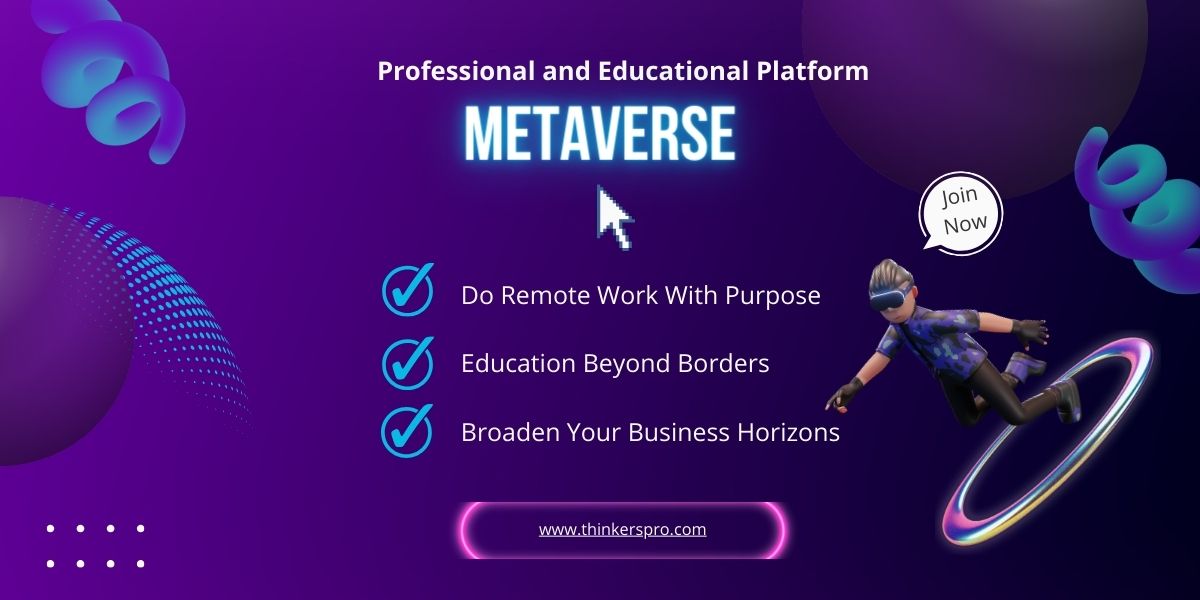The Metaverse: Redefining Virtual Spaces
The concept of the Metaverse has captured the imagination of tech enthusiasts and professionals alike. At its core, the Metaverse is a vast and interconnected virtual space that offers experiences and social interactions enriched with the depth and persistence of the real world. Unlike traditional video conferencing tools or static chat rooms, the Metaverse provides a three-dimensional virtual environment where participants have the freedom to explore, interact, and express themselves in ways previously limited to in-person encounters.
Virtual Meetings in the Metaverse: A Leap Forward
As businesses and teams continue to adapt to remote work, the Metaverse is emerging as a game-changer for virtual meetings. Human interaction is a fundamental aspect of communication, and the Metaverse addresses this by allowing avatars to convey body language and spatial presence, creating a more natural and immersive meeting experience. With tools to share multimedia content and collaborate in real-time, virtual meetings in the Metaverse enable a level of engagement that transcends the capabilities of traditional video calls.
Enhanced Collaboration Through Digital Twins
One of the most exciting aspects of the Metaverse is the use of ‘digital twins,’ virtual replicas of physical environments or objects. These twins allow teams to interact with their projects on a one-to-one scale, facilitating a deeper understanding and more innovative problem-solving approaches. Whether it’s working on architectural designs or product prototypes, digital twins within the Metaverse can lead to unprecedented collaboration among team members scattered across the globe.
Networking Beyond Geographical Limits
Beyond internal meetings, the Metaverse extends its utility to networking and business development. Virtual conferences and trade shows within the Metaverse empower attendees to network without the constraints of distance, time zones, or physical barriers. This level of accessibility fosters global connections and opportunities that were once limited to those who could travel to specific locations at set times.
Accessibility and Equity in the Metaverse
The promise of the Metaverse also brings with it considerations of accessibility and inclusivity. Ensuring that virtual meeting spaces are welcoming to all, regardless of physical ability or technological proficiency, is paramount. Thoughtfully designed metaversal platforms can break down barriers, providing assistive technologies and customizable interfaces that cater to a wide range of users. Such inclusivity not only enriches the virtual environment but also reflects a commitment to equity that is integral to the success of any meeting platform.
The Advantages of Hosting Board Meetings in the Metaverse
As the digital landscape continues to evolve, companies are seeking innovative approaches to traditional business practices. Hosting board meetings in the Metaverse is an emerging trend that offers a plethora of benefits. This virtual realm provides an immersive environment for board members to collaborate, engage, and make crucial decisions, irrespective of their physical locations.
Enhanced Accessibility and Flexibility
The most notable advantage of the Metaverse is its ability to make meetings more accessible and flexible. Board members can log in from anywhere in the world, reducing the need for travel and allowing for more frequent and inclusive gatherings. This not only saves time and costs but also increases the potential for board inclusivity, enabling a diverse range of perspectives that might otherwise be logistically challenging to include.
- Reduces travel expenses and time commitments
- Allows for greater scheduling flexibility
- Improves attendance rates among busy executives
Innovative Collaboration and Engagement Tools
Within the Metaverse, participants have access to cutting-edge tools that enhance collaboration. Dynamic presentations with 3D models, virtual whiteboards, and real-time document editing are just a few examples that transform meetings into interactive sessions. These tools empower members to present ideas in new ways, fostering creativity and engagement that goes beyond traditional video conferencing capabilities.
- Interactive 3D presentations and simulations
- Real-time collaborative document handling
- Virtual breakout rooms for focused discussions
Creating a Customizable and Controlled Environment
The Metaverse also provides the ability to create customizable meeting spaces. Instead of leasing or maintaining physical meeting rooms, organizations can design virtual spaces that reflect their brand or meeting purpose. These bespoke environments can be controlled for privacy, ensuring that sensitive discussions remain confidential. Additionally, they can be reconfigured as needed for different meeting types, from formal board sessions to casual networking events.
- Customizable spaces for brand alignment
- Control settings to ensure privacy and security
- Adaptable environments for various meeting styles
Embracing the Metaverse for board meetings not only caters to the contemporary needs of businesses but also sets a precedent for future-proofing organizational practices. It is an efficient, engaging, and secure method that enriches the meeting experience for all participants.
Setting Up Your Company’s Virtual Boardroom in the Metaverse
It is crucial for decision-makers to weigh the pros and cons, focusing on aspects such as data security, customizability, and the availability of meeting facilitation features. Opt for a platform that not only reflects your company’s corporate image but also elevates the way you collaborate and interact.
Integrating Advanced Communication Tools
Advanced communication is the bedrock of a successful virtual boardroom in the metaverse. Virtual reality (VR) headsets and motion tracking equipment can catapult board members into a shared digital space, facilitating a seamless communication experience. It allows participants to engage with content and collaborate more effectively than traditional video conferencing setups. When opting for these tools, prioritize comfort, ease of use, and compatibility with your chosen platform.
Incorporating AI for Enhanced Meetings
Artificial intelligence (AI) can be a game-changer for conducting meetings within the virtual boardroom. AI-powered assistants can help schedule meetings, send reminders, synthesize meeting minutes, and even provide real-time language translation. Such technology ensures a streamlined meeting flow and supports inclusivity in a diverse, globalized workspace.
Creating a Customizable Environment that Reflects Your Brand
The customization of your virtual boardroom is a reflection of your company’s brand identity and culture. Most metaverse platforms allow for extensive personalization, enabling you to construct an environment from the ground up or modify existing templates. Tailor the space with your company’s logo, colors, and even digital facsimiles of your headquarters to forge a stronger connection between virtual and physical operations.
Ensuring Security and Confidentiality in the Metaverse
Perhaps nothing is as vital as ensuring the security and confidentiality of discussions and data within the virtual boardroom. As with any digital tool, the metaverse comes with risks that must be vigilantly managed. Employ robust encryption, multi-factor authentication, and dedicated private servers (if feasible) to mitigate the likelihood of security breaches. Moreover, educate board members on cybersecurity best practices within virtual environments to foster a culture of security-mindedness in the metaverse.
Real-world Examples: Successful Corporate Governance within the Metaverse
In the ever-expanding metaverse, traditional concepts of corporate governance are being reshaped to meet the unique needs of virtual ecosystems. Companies that have successfully transitioned into this new domain demonstrate an unwavering commitment to integrating their core values into every digital decision, policy, and strategy they implement. This steadfast dedication ensures that stakeholders maintain trust even as the boundaries between the physical and virtual worlds blur.
Incorporating Transparency and Accountability
One hallmark of effective corporate governance within the metaverse is the heightened focus on transparency. As interactions and transactions become increasingly decentralized, maintaining clear records and communication pathways is essential. An illustrious example is a multinational technology firm that has created a virtual ledger, accessible to all users, that tracks every change to its virtual spaces. By championing progress with openness, such companies are cultivating an environment where accountability and trust thrive.
Promoting Ethical Conduct and User Privacy
Another pillar of good governance in the metaverse is the serious treatment of ethical conduct and user privacy. A leading metaverse platform has been internationally recognized for its comprehensive code of ethics, which is deeply embedded into its user interface, ensuring all participants adhere to honorable behavior. Moreover, it magnifies its commitment to privacy by employing state-of-the-art encryption and anonymization techniques, thus setting a robust standard for others to follow.
Engaging in Stakeholder Involvement and Community Governance
A prime example of successful corporate governance within the metaverse is visible in the way some organizations foster stakeholder involvement. An innovative approach by a pioneering virtual real-estate company stands out in this regard. It has established a digital town hall where users can voice their opinions and vote on major developments, effectively allowing the community to steer the company’s trajectory. Such active engagement ensures that governance in the metaverse is not merely top-down but a collaborative effort that resonates with the collective vision of its participants.
Ensuring Sustainable Practices and Long-Term Viability
The transition into virtual spaces does not absolve entities from the responsibility of sustainable practices. An exemplary display of this principle is by a gaming company that has integrated renewable energy simulations in its metaverse infrastructure, signaling its commitment to sustainability. By doing so, it not only acts as a role model for environmental stewardship but also ensures long-term viability for the company within the digital universe.
Bold steps taken in these realms are setting the standard for thriving corporate governance within the metaverse. The real-world applications of these principles map out a promising landscape for businesses willing to evolve and embrace the new challenges and opportunities that the metaverse presents.
Preparing for Future Boardroom Dynamics: The Skills Required in the Metaverse
The concept of a metaverse is quickly evolving from a speculative idea into a digitally immersive reality. As we gear up to transfer boardroom interactions to virtual realms, it’s vital to comprehend the breadth and functionality of the metaverse. It extends beyond mere digital meeting spaces, promising a multifaceted ecosystem for real-time collaborations. Intuitive navigation of this territory involves familiarizing oneself with advanced virtual reality (VR) technology, understanding the economic models of digital assets, and grasping the nuances of virtual engagement and communication. To smoothly transition into the metaverse’s boardroom dynamics, one must be curious, diligent in learning, and adaptable to the swiftly transforming digital environment.
Technical Proficiency and Virtual Collaboration
To be effective in the metaverse boardroom, technical proficiency is non-negotiable. Leaders and participants must adapt to tools such as VR headsets and other sophisticated devices that facilitate virtual presence. Beyond the gear, it’s critical to master software applications that run these new-age boardrooms. As you encounter inevitable technological hiccups, your problem-solving skills and patience will be equally tested. Moreover, mastering virtual collaboration tools will enable seamless project management and decision-making in a decentralized yet interconnected boardroom space.
Embracing New Communication Dynamics
Communication takes on a different dimension in the metaverse. Beyond verbally articulating ideas, participants will need to convey their perspectives through additional layers like digital avatars and gestures. Proficient communication in this context means being capable of expressing and interpreting messages accurately in a 3D virtual environment. This includes selecting the appropriate avatar gestures and mastering in-world communication tools, thereby ensuring clarity and understanding among all board members in the metaverse.
Innovative Leadership and Decision Making
In the metaverse, traditional leadership and decision-making approaches may need significant alterations. An innovative mindset is crucial for guiding teams through uncharted digital territories. Leaders must exhibit flexibility and open-mindedness, as metaverse boardrooms could bring about unconventional ways to tackle governance and corporate strategies. The virtual realm presents an opportunity for leaders to harness diversity, encouraging creative contributions from global talents whose insights might be bound by geographic constraints in the physical world. Decision-making in the metaverse will require a forward-thinking attitude and the readiness to embrace novel methodologies for the greater benefit of the organization.
Navigating Ethical and Security Issues
The metaverse’s expansiveness brings forth potential ethical and security challenges that must be addressed by board members. With its ability to replicate intricate aspects of reality, leaders in the metaverse will be responsible for safeguarding data privacy and ensuring ethical standards are met. The immersive nature of this sphere intensifies the impact of security breaches, making robust security protocols and ethical guidelines non-negotiable for future virtual boardroom operations.













0 comentarios